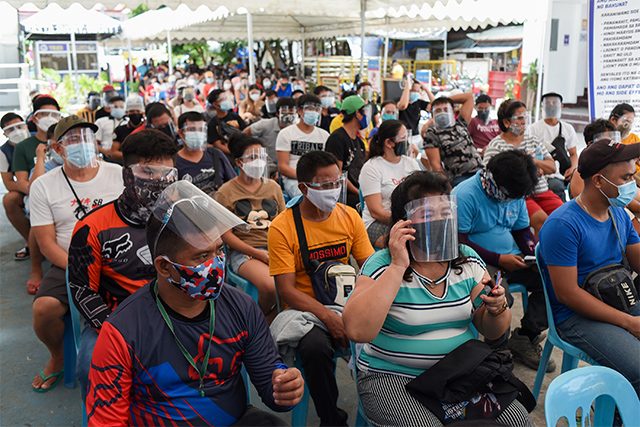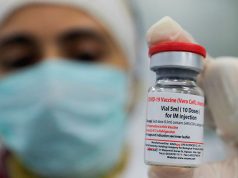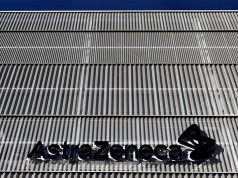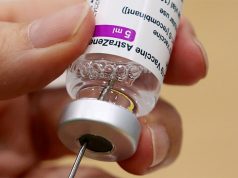
In recent days, there has been a clamorous discussion among policymakers on whether the Philippines should continue to require wearing a face shield or not.
“Hindi na po kinakailangan ng face shield sa labas (outdoors) kasi hindi naman po inapela ‘yan ng IATF. Ang inapela lang ng IATF ‘yong pagsuot ng face shield sa loob (indoors),” said presidential spokesperson Harry Roque in a briefing on Monday, June 21.
“When I mentioned the face shield, I was only shooting the breeze with the members of the Congress who were there. I never said with finality that we will do away with the face shield,” President Rodrigo Duterte said on the same day, citing the need to be more cautious over the highly infectious Delta coronavirus variant (B1617).
READ: To wear or not to wear: Palace confirms Duterte’s order on face shield use amid differing statements
While officials continue to contradict statements of each other regarding the face shield policy, some Filipino online users suggested that they should instead focus on boosting the vaccine supply of the country.
“Increase vaccine roll out, heck the utilization reports of each LGUs, open the vaccination to all groups now. Huwag niyo na ipagpilitan pa ang p******** face shield na ‘yan na ginagawang head band,” a Twitter user suggested on Tuesday.
“Most countries in Southeast Asia are already producing vaccines via tech transfer, started to develop their own, and/or preparing to reopen, samantalang sa Pilipinas, face shield pa din ang pinaguusapan?” another said last Thursday.
Reaching herd immunity
Philippines is lagging behind its neighbors’ vaccine rollout and among the last country projected to achieve herd immunity.
United Kingdom-based Pantheon Macroeconomics, an international economic intelligence, said that the slow pace of vaccine rollout in the country would likely result in an early 2023 herd immunity.
“At the current pace of vaccination, the #Philippines won’t hit anything close to herd immunity until early 2023, even if we assume that the level of protection from prior infection is umpteenth times the official case-count,” Senior Asia economist Miguel Chanco said in a tweet.
In a survey on willingness for vaccination conducted by Social Weather Stations last May 20, only 32% of Filipinos said they are willing to receive the COVID-19 vaccine, 35% are uncertain about it, and 33% are not willing to take the jab.
Fear of side effects happens to be the top reason why some Filipinos are uncertain and not willing to be vaccinated. They worry about the effectiveness of the COVID-19 vaccine and rumors about possible deaths.
It’s been half a year since the Philippines mandated the use of a face shield, yet the country still experienced an increase in COVID-19 infections earlier in 2021. Last April 2, the daily COVID-19 cases in the country peaked at 15,310.
The Philippines has administered some 8.4 million doses of COVID-19 vaccine as of June 20, according to the latest data of the Department of Health.
Chanco said that if the Philippines wants to achieve any semblance of herd immunity at the end of the year, it would need to vaccinate around 280,000 people a day.
But given the data at hand, Chanco believed that it would be impossible to accomplish.
Local independent tracker herdimmunity ph, likewise, said that it will take about 1.7 years or until March 2023 to fully vaccinate 70M Filipinos and achieve herd immunity.
As of June 13, the tracker said the country is administering an average of 208,399 vaccinations daily.
Meanwhile, Melvin Sanicas, physician-scientist specializing in vaccines, also said equipment alone will not prevent COVID-19.
“Even with a #faceshield & a #facemask, it is important to follow other #publichealth guidelines: #physicaldistancing & avoiding crowded settings – especially indoor spaces with poor ventilation. #WashYourHands often & #GetVaccinatedASAP,” he tweeted.
On Monday, Palace and Duterte retained the standing requirement on face shield indoors and outdoors.
Dr. Edsel Salvana, also a member of the health department’s technical advisory group, cited the threat of the new Delta variant as a reason why his group recommended continuing to use of face shields.
RELATED: Final directive? Duterte retains face shield protocol after varying announcements from officials








